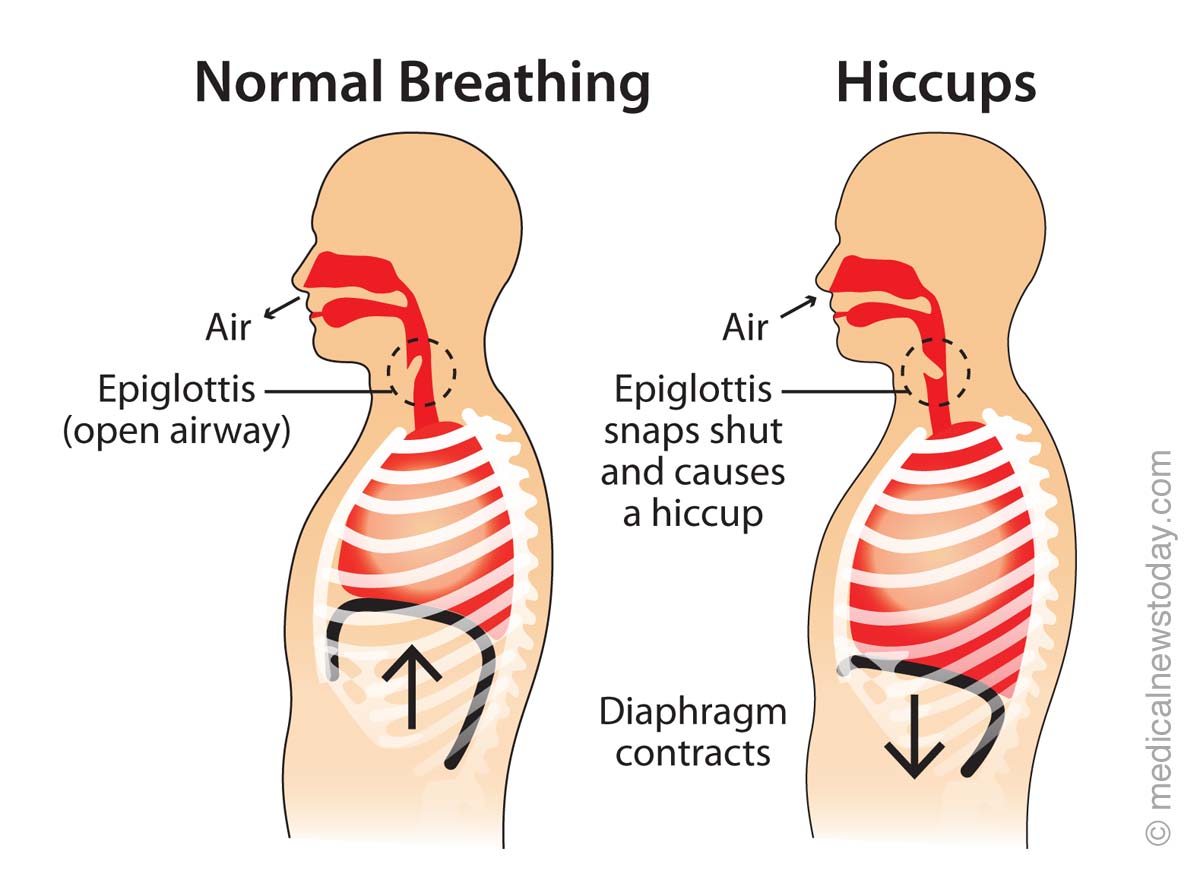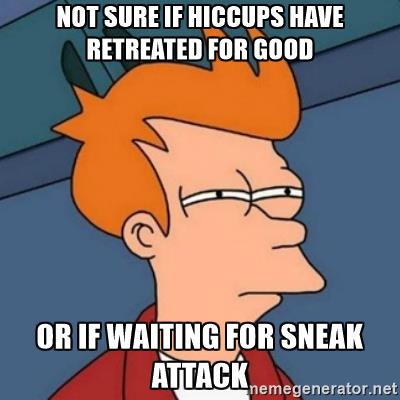
Earlier last week, I was on the phone with my mom when she experienced a sudden onset of hiccups. In between sputtering gulps, she lamented to me, “What causes these darn things anyway?” By coincidence, my brother would express the same thing to me hours later when he too was afflicted. (Incidentally, I told them both that it would make a great topic for my blog, to which they both replied, “What blog?”)
How Hiccups Work
What most of us already know is that hiccups are the result of involuntary spasms of the diaphragm muscle. (In case you need a refresher in Bio 101, the diaphragm is the muscle under our lungs that helps them expand and contract to inhale or exhale air.) The official term is: synchronous diaphragmatic flutter (SDF).
When the diaphragm twitches, it causes air to rush into our lungs. That in turn causes the opening between our vocal cords to snap shut, causing the characteristic ‘hic’ sound in our throats.

What Triggers Them
In normal people, hiccups are trigged by some irritation of the nerves that extend from the neck to the chest and stomach (vagus and phrenic nerves).
The weird thing is, unlike other involuntary reactions to irritation (such as sneezing), hiccups seem to serve no definite purpose. In theory, sudden bursts of air rushing into our chest cavity could shake loose whatever is irritating it. However, unlike the mote of dust that lands in our nasal cavity and triggers a sneeze, the irritants that tickle our vagus and phrenic nerves tend to be more generalized. They include:
- Eating or drinking too much too quickly and expanding the stomach
- Swallowing too much air (while talking, eating, chewing gum, etc.)
- Smoking
- Drinking too much alcohol
- A sudden change in stomach temperature, such as drinking a hot beverage and then a cold beverage.
- Emotional stress, anxiety or excitement.
Despite a laundry list of home remedies, hiccups usually go away on their own. In rare cases, hiccups that occur very frequently or won’t go away can be a sign of a serious neurological disorder such as brain injury or tumor, medication/drug toxicity, diabetes, or multiple sclerosis.
But if you are experiencing persistent hiccups, don’t freak out just yet. In otherwise healthy individuals, hiccups that last for more than 48 hours can be due to an ongoing irritation, like:
- A hair or something else in your ear touching your eardrum
- A tumor, cyst or goiter in your neck
- Gastroesophageal reflux (indigestion)
- Sore throat or laryngitis
The Guinness World Record for longest bout goes to American Charles Osborne. After experiencing a small stroke while lifting a hog he was butchering, Charles was afflicted with hiccups for 68 years (from 1922 to 1990). During that period, he hiccuped an estimated 430 million times!

Getting Rid of Them
Even if your hiccups aren’t going to stick around for the rest of your life, sometimes it can feel that way – especially when they occur at inconvenient times. History has given us hundreds of crazy ways to get rid of hiccups, from being startled to standing on your head while eating mustard.
Interestingly, what many of these home remedies have in common is that they could all be on the list of hiccup-causing irritants.
Sucking water through a straw, drinking with your head tilted, or gargling can lead you to swallow air. Eating a spoonful of mustard, peppermint oil or downing a shot of hot pickle juice can irritate your stomach and esophagus. Getting startled triggers anxiety. Almost every hiccup cause on the list has dozens of related cures. (No one has suggested drinking copious amounts of alcohol, but then I guess you’d have even bigger problems).
 I think the best remedies go straight to the source and put direct pressure on the vagus or phrenic nerves, such as pulling on your tongue, holding a deep breath, or hugging your knees to your chest.
I think the best remedies go straight to the source and put direct pressure on the vagus or phrenic nerves, such as pulling on your tongue, holding a deep breath, or hugging your knees to your chest.
The reason these cures may work is because you are introducing a new stimulus into the mix. Think of our hiccuping system as being in full panic mode, running around in circles, babbling incoherently. Sometimes the best way to stop the hysterics is with a good shake. You know: *Slap!* “Snap out of it!”
In the moment it takes for our system to process the new irritant, it has a chance to pause the out-of-control cycle and get a handle on things. By any luck, it’ll recognize the situation for what it is and stop overreacting. (Disclaimer: The Ever Wonder blog does not condone using this same approach with your significant others.)
